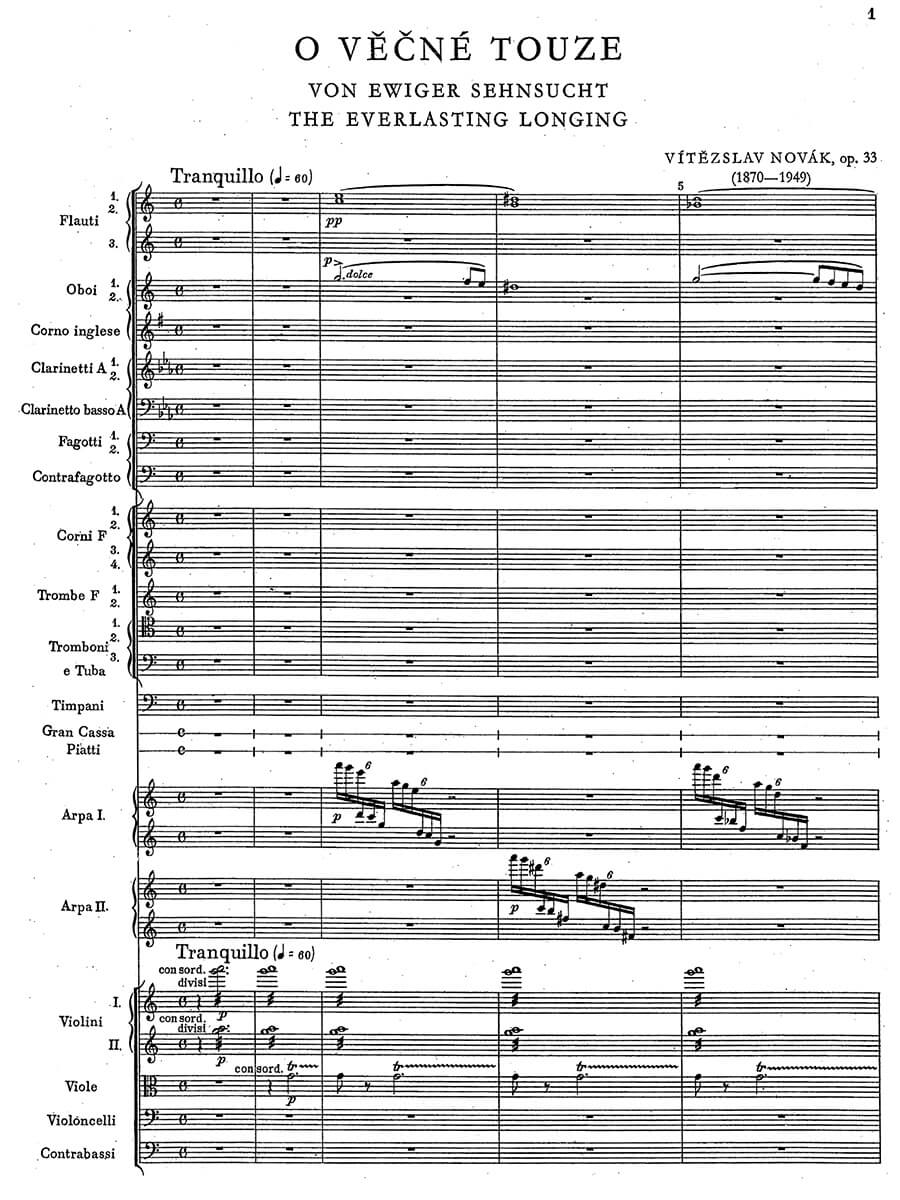O Věčné Touze (Of Eternal Longing) Op. 33, symphonic poem
Novák, Vítezslav
27,00 €
Vítězslav Novák – O Věčné Touze (Of Eternal Longing) Symphonic Poem Op. 33 (1903-05)
(b. 5 December 1870, Kamenice nad Lipou – d. 18 July 1949, Skuteč)
Tranquillo (p. 1) – Più lento (p. 4) – Poco a poco più animato (p. 7) – Maestoso (doppio movimento) (p. 13) – Poco a poco più animato (p. 21) – Animato (p. 26) – Stringendo (p. 27) – Più animato (p. 28) –
Grandioso (p. 35) – Tempo del comincio (p. 36) – L’istesso tempo, un poco animando (p. 41) – Sostenuto (p. 44) – Doppio movimento (p. 47) – Appassionato, doloroso (p. 56) – Più lento quasi andante espressivo (p. 60) –
Poco più animanto (p. 61) – Ancora più animato (p. 62) – Accelerando poco a poco (p. 63) –
Passionato doloroso, più mosso come sopra (p. 65) – Tempo come sopra – Poco più animato (p. 71) – Ancora poco più animato (p. 72). Sempre più passionato (p. 74) – Exaltando, con sommo affetto (p. 77) – Largamente, ma sempre assai passionato (p. 79) – Andante doloroso (p. 80) –
Tempo del comincio, tranquillo (p. 82) – Un poco più lento, assai tranquillo (p. 89)
Preface
As one of the most important Czech composers of the generation after Dvořák, Vítězslav Novák, similarly to the one decade older Josef Bohuslav Foerster and the one decade younger Otakar Ostrčil, ultimately fell into the shadow of the late creative blossoming of Leoš Janáček and of his friend Josef Suk, who died too early. Today, Novák‘s music is performed almost exclusively in the Czech Republic, and this – despite his reputation – not too often. His first formative teacher was the conductor Vilém Pojman (1852-1921) in Jindřichův Hradec. Then he studied at the Prague Conservatory, first with Karel Knittl (1853-1907), then with Karel Stecker (1861-1918), and finally in 1892 with Antonín Dvořák. After graduation he was a piano pupil of Josef Jiránek (1855-1940) until 1896. After the Piano Trio op. 1 and the Piano Quartet op. 7, the Piano Quintet op. 12, completed in 1897, was Novák‘s first work to receive lasting recognition. These early chamber music works were later followed by three string quartets (op. 22, 35 and 66), the piano trio op. 27 ‚Quasi una ballata‘ and the sonata for cello and piano op. 68. Novák‘s first orchestral work was the concert overture ‚The Corsair‘ in 1892, followed by the quite successful Serenade in F major for small orchestra from 1894-95. In 1895 he also wrote his only piano concerto, in 1898 the dramatic overture Maryša op. 18, and then came Novák‘s great breakthrough as an orchestral composer with the symphonic poem ‚In the Tatra Mountains‘ op. 26 in 1902. This and the five following works consolidated his reputation as a leading creator of Czech music, and several of these compositions appeared in print at Universal Edition in Vienna: the ‚Slovak Suite‘ for small orchestra op. 52 (1903), the Andersen tone poem ’Of Eternal Longing‘ op. 33 (1903-05), the Serenade for small orchestra op. 36 (1905), the symphonic poem ‚Toman and the Wood Nymph‘ op. 40 (1906-07) and the tragic concert overture ‚Lady Godiva‘ op. 41 (1907). The conclusion of this series of compositions that have been occasionally heard outside the Czech Republic to this day is the Sea Fantasy for solo voices, choir and orchestra ‚Bouře‘ (The Tempest) op. 42 (1908-10) and the orchestration of his large five-movement tone poem ‚Pan‘ for piano op. 43 (1910/12). …
Read full preface > HERE
| Score No. | |
|---|---|
| Edition | |
| Genre | |
| Printing | |
| Pages |
